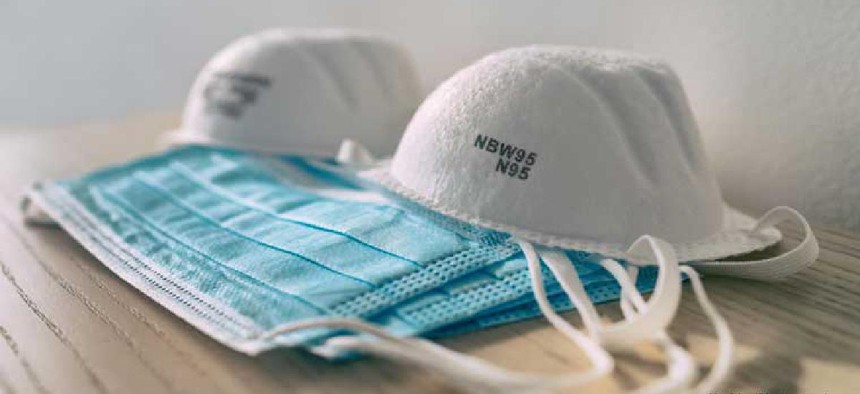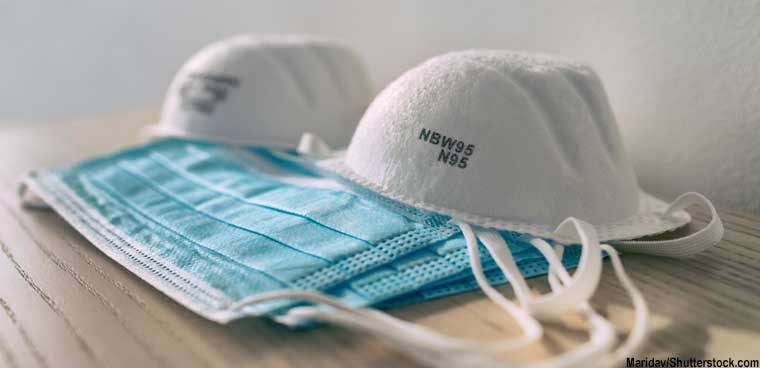Mapping the PPE supply chain

Ninety days after the COVID-19 emergency declaration, a Senate panel examined how U.S. responders are managing procurement and delivery of needed supplies.

As part of the COVID-19 pandemic response, a multiagency effort collected commercial data on personal protective equipment from distributors to visualize the supply chain and help direct material where it was needed most, according to a senior defense official testifying at a June 9 oversight hearing.
Rear Adm. John Polowczyk, vice director of logistics for the Joint Chiefs of Staff, told the Senate Homeland Security and Government Affairs committee convened to discuss federal procurement 90 days after President Donald Trump's declaration of a national emergency that an "unprecedented" effort assembled a new data system in just two weeks.
"We consolidated business systems data from the six major medical distributors into the cloud at [the Federal Emergency Management Agency] creating a data lake of information for the first time using a supply chain tool" from the Defense Department. "We could now see inventory held by competing companies for distribution in the U.S. and how the supply chain was filling those orders," Polowczyk, who directs the cross-agency Supply Chain Stabilization Task Force, said.
That supply chain data from commercial firms Cardinal Health, Concordance, Henry Schein, McKesson, Medline and Owens and Minor, was combined with information from the Centers for Disease Control and Prevention "to ensure that commercial markets moved resources to the hot spots." Polowczyk added that expansion of this effort is needed to "align U.S. manufacturers with current COVID and future demands."
The system was used to support Project Air Bridge, a White House effort led by Jared Kushner, the president's son-in-law and senior advisor, to transport and distribute needed PPE to COVID hotspots. Multiple press reports and congressional oversight efforts have described that effort as mismanaged, duplicative and ineffective when it came to distributing N95 masks, one of the most needed items in the PPE arsenal.
Sen. Elizabeth Warren (D-Mass.) is leading a push to have the Pandemic Response Accountability Committee, currently led by Justice Department Inspector General Michael Horowitz, investigate the $91 million program.
"Our investigation found Project Air Bridge -- like the broader Trump Administration response to coronavirus -- has been marked by delays, incompetence, confusion, ethics questions, and secrecy across multiple federal agencies and in the White House," Warren said in a June 8 statement.
According to written testimony submitted jointly by Polowczyk and FEMA Director Peter Gaynor, the project "was integral to the federal strategy to manage critical shortages of PPE and other medical supplies by accelerating international deliveries until domestic and foreign manufacturers could increase production to well above pre-COVID-19 levels and standard supply chains could begin to stabilize."
Additionally, at the hearing, Gaynor and Polowczyk testified that they didn't have any knowledge of any intervention from the White House to direct contracts or delivery of supplies to favored states or institutions.
"I have the highest confidence in my contracting team … that every contract was executed according to all the federal regulations without influence from anyone in government no matter where they sit," Gaynor said in response to question from Sen. Kamala Harris (D-Calif.)
According to officials and to FEMA data obtained and released by Sen. Maggie Hassan (D-N.H.) at the June 9 Senate hearing, the U.S. is stepping up efforts to increase domestic manufacture of some needed items, including N95 masks.
"I've had a consistent frustration … about the administration's inability or refusal to publicly lay out clear, numerical projections and goals for its COVID-19 response," Hassan said.
According to data from the Supply Chain Stabilization Task Force, FEMA expects domestic production of N95s to exceed the need of hospitals by August. By October, according to FEMA, monthly production will exceed 140 million, meeting the needs of hospitals, long-term care facilities and first responders. The agency hopes that by winter, U.S. manufacturers will be producing 180 million masks per month. The task force is also overseeing a push to increase domestic manufacture of medical gowns, surgical masks, face shields and nitrile gloves.
Sen. Rob Portman (R-Ohio) wanted more details on when the government, under the auspices of FEMA or the Defense Logistics Agency, would begin to issue long-term contracts to send "demand signals" to vendors that the U.S. is serious about "reshoring" PPE manufacture.
Polowczyk said that he was currently working on "aggregating long-term demand" from government buyers, including DOD, FEMA and the Department of Veterans Affairs as well as states to "bring that to industry to say that this a repeatable long-term demand for health care items, not just PPE."



